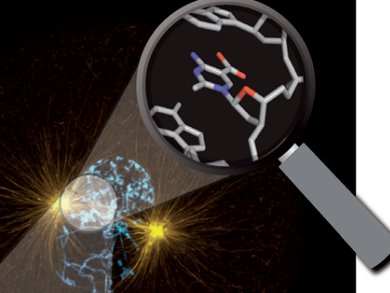Epigenetics — a molecular basis for how genetic information other than DNA sequence can influence gene function — is a rapidly developing field. Hydroxymethylcytosine (hmC) is a new DNA base that was detected in high quantities in various tissues and in embryonic stem cells. It is thought that hmC is an intermediate in active demethylation pathways that allow cells to actively remove the C5-methyl groups of mC in the absence of replication. This removal may enable cells to unblock silenced genes and therefore dynamically modulate their genetic program.
Thomas Carell and co-workers, Ludwig-Maximilians-University, Germany, have efficiently incorporated hmC, and its related oxidized forms, 5fC and caC, into DNA (pictured). Using a newly designed in vitro mutagenicity assay, the strands were used to show that the DNA bases of fC and caC are non-mutagenic, and therefore may be involved in the epigenetic programming of cells without disturbing the genetic information.

Images: © Wiley-VCH
- Improved Synthesis and Evaluation of Oligonucleotides Containing 5-Hydroxymethylcytosine, 5-Formylcytosine and 5-Carboxylcytosine
M. Münzel, U. Lischke, D. Stathis, T. Pfaffeneder, F. A. Gnerlich, C. A. Deiml, S. C. Koch, K. Karaghiosoff, T. Carell,
Chem. Eur. J. 2011.
DOI: 10.1002/chem.201102782




